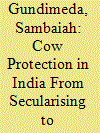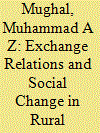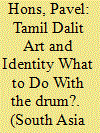|
|
|
Sort Order |
|
|
|
Items / Page
|
|
|
|
|
|
|
| Srl | Item |
| 1 |
ID:
159755


|
|
|
|
|
| Summary/Abstract |
Cow protection, a potent tool in the hands of cow vigilantes for atrocities against Muslims and Dalits, has become a heavily politicised issue in contemporary India. Its roots, connecting the themes of caste-Hindu religious sentiment, communalism and economic reasoning, can be traced to the late nineteenth century, though basic problems over the intriguingly complex use of cattle are clearly much older. This article relates contemporary cow protection debates specifically to Arya Samaj arguments against cow slaughter in the late nineteenth century and publication of a special issue of the journal Kalyan, titled Gau Ank, in 1945. The discussion shows how cow protection debates in the Constituent Assembly of India and in subsequent post-independence judicial verdicts were heavily influenced by these two earlier discourses. Analysing two landmark judicial decisions on cow slaughter, the article argues further that recent judicial endorsement of cow protection legitimises Hindu majoritarian sentiments in the law, while depriving millions of Indians, not just Muslims, of fundamental rights to food and livelihood. The conclusion attempts to consider some possible solutions to the current impasse.
|
|
|
|
|
|
|
|
|
|
|
|
|
|
|
|
| 2 |
ID:
159752


|
|
|
|
|
| Summary/Abstract |
In Bangladesh, one of the world’s poorest countries, a significant proportion of its most deprived citizens are elderly women living in rural areas, where healthcare access remains difficult. This article argues that as citizens, such elderly women, too, should have a constitutional right to healthcare access. Meeting this constitutional and human rights challenge is a joint obligation for the government and healthcare professionals. Yet, socio-economic discrimination and several cultural factors at individual, societal and institutional levels are known to limit access to healthcare services for elderly rural women in Bangladesh, who represent a highly vulnerable population group in Bangladesh regarding healthcare and healthcare access. This article first examines demographic ageing trends and then highlights key issues concerning the necessity of securing better healthcare for rural elderly women (REW) in Bangladesh.
|
|
|
|
|
|
|
|
|
|
|
|
|
|
|
|
| 3 |
ID:
159756


|
|
|
|
|
| Summary/Abstract |
In recent decades, the nature of exchange relations in rural Pakistan appears to have undergone significant transformations due to the gradual shift from seasonal agriculture to a market-based economy, rapid urbanisation and industrialisation. Change and continuity in exchange relations are particularly manifested in rituals and ceremonies associated with childbirth, marriage and death, with socioeconomic transformations in the rural economy triggering shifts in ways of conducting such rituals and ceremonies. This article seeks to highlight such change but argues that the continuing centrality of religion, kinship and economic inter-dependencies, marked by rural social organisation, remains evident in how these rituals and ceremonies are conducted. After discussing the social meanings of such rituals and ceremonies in rural Pakistan, the article demonstrates through detailed ethnographic study certain modifications in exchange relations as a consequence of recent socioeconomic change.
|
|
|
|
|
|
|
|
|
|
|
|
|
|
|
|
| 4 |
ID:
159753


|
|
|
|
|
| Summary/Abstract |
Using reports about local resistance of the smallpox vaccination between 1800 and 1805 in colonial India, this brief article analyses how the diversity in both the level and type of resistance, depicted in earlier primary sources, has been distorted by later accounts into a single category of ‘South Asian smallpox vaccination resistance’. Careful analysis of the historical primary documents demonstrates, however, that such resistance stemmed from a variety of reasons, including sanitary concerns, political discontent and practical difficulties in arriving at vaccination centres. The article therefore suggests the need for more careful handling of earlier primary sources in order to not lose evidence of early diversities in reactions to colonial interventions.
|
|
|
|
|
|
|
|
|
|
|
|
|
|
|
|
| 5 |
ID:
159754


|
|
|
|
|
| Summary/Abstract |
Based mainly on printed sources in Tamil, as well as interviews with Dalit activists, this article seeks to map current divergent attitudes of Dalits towards folklore and especially towards the drum. While most activists argue for the rejection of drumming as a symbol of oppression and untouchability, some try to use it as a means of mobilisation. Others speak in favour of the resignification of the instrument and its protection and preservation as a part of their cultural legacy, which they consider to be different from the mainstream. The article also sets out to correlate these attitudes with the ideology of the eradication of caste and points to the ensuing dilemmas connected with emphasising caste-based identities.
|
|
|
|
|
|
|
|
|
|
|
|
|
|
|
|
|
|
|
|
|